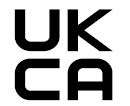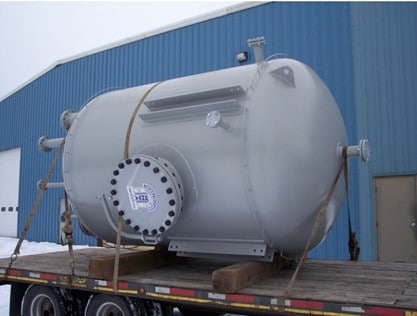Potential disruption facing manufacturers and supply chains should they not achieve UKCA Certification in time
Nearly 53% of UK imports come from the EU, making them their largest trading partner. The onset of Brexit may have caused disruptions between the two, but companies anticipated it, and, sometimes, with drawbacks, can come benefits and changes. The UK now has more freedom in creating its trade deals and regulations. One of the most notable changes for manufacturers surrounds the UKCA mark.
The UKCA (UK Conformity Assessment) mark is the new UK product marking that will replace the CE mark for products that will be placed into the Great Britain (England, Wales, and Scotland) market. Like the CE mark, the UKCA mark is placed on products and is a legal requirement to declare they are safe and comply with essential health and safety requirements. Its objective is to ensure there is no reduction in product safety, accuracy, or consumer protections due to Brexit. It also aims to ensure the effectiveness of the current legislative framework is maintained.
Starting January 1, 2025, the CE mark will no longer be recognized by the GB market. Manufacturers outside the UK will need to apply the UKCA mark to any products they intend to put into service into the UK. Knowing what product types are covered, when conformity still applies, and how to declare for UKCA marking can be difficult.

The UKCA Mark
BSI is a world-renowned and highly respected test authority. Our aim is to provide organizations with knowledge and best practices to make excellence a habit. As one of the few approved bodies offering UKCA marking, we will ensure strong design testing and consistency in production via quality control.
Our technical expertise and knowledge of standards and regulations make us a great partner in reducing risks due to product defects and non-conformity. We will make sure your testing and compliance needs are not overly burdensome and make it fast and easy for your products to achieve the UKCA marking, particularly where you already have CE Marking certification in place for your products.
Ensuring your products attain the UKCA marking as early as possible will help preserve your access to the UK market and build resilience in your business.
Potential Disruptions
It is essential that manufacturers understand the legal consequences that can emerge as a result of incorrect and/or lack of product marking, especially if there is an incident with the product or if the product fails market surveillance by the responsible authority. Companies have until the end of 2024 to make sure that they are fully prepared, and don't suffer unintended outcomes. The following are the potential disruptions manufacturers could experience if they don’t achieve the UKCA mark by the end of the year.
- Being Barred from GB Market Access - Starting January 1, 2025, only the UKCA mark will be allowed for market access in Great Britain. In some instances, other certification marks might also be required by the market but are not necessarily mandated, whereas UKCA is the minimum legal requirement. Obtaining the UKCA mark will eliminate the risk of disruption to your services by ensuring you can access GB markets freely.
- Delays in Transport and Supply Routes - Failure to achieve the UKCA marking by the end of the year would result in difficulty reaching clearance at UK borders.
- End of the Year Rush - Relative to the notified bodies in the EU, which are responsible for CE marking, there are still very few approved bodies for UKCA marking. Though companies and manufacturers still have until the end of 2024 to have the UKCA marking affixed to their products, a potential end of the year rush can still occur. As the deadline nears, approved bodies may not have enough capacity to accommodate the testing and compliance needs of manufacturers. This could lead to a scarcity of testing facility space and lengthier legislation processes.
- Lowered Confidence throughout Supply Chain– Complying last minute could lower the confidence buyers throughout the supply chain have in your products’ ability to meet current legislation. Applying the UKCA mark as soon as possible will increase customer trust in your brand especially with regards to safety and proper handling.
- Customer uncertainty- There’s still a lot of misconceptions about UKCA. Some customers are even demanding it now from our CE certificate holders even though it’s still allowable until the 31 December 2024 and then still technically allowable if already placed on the market. Although it’s technically allowable manufacturers may want to avoid the pain explaining things
- Technical difference between directives and regulations- The UK regulations are technically similar to the EU regulations and directives. The designated standards and harmonised standards are the same for now. There are some differences however and these can really trip up manufacturers. For example material manufactures for PED are required to have a quality system (.ie. ISO 9001) certificated by an organization based in the EU. It’s important not to leave things to the last minute to discover issues like this.
- Physically marking the product- For some products that have UKCA certification but are challenging to change the physical marking, there is a provision to allow UKCA marking to be made on an accompanying label for a year after the UKCA deadline. Just a year might not be enough for some slow moving products and components so gaining certification early will allow more time to make this change.
- Potential Rule Changes – The CE mark is still valid for use in the GB market until the end of 2024 and only for areas where GB and EU rules remain the same. If the EU changes its rules and you apply the CE mark to your products based on those new rules, you will not be able to sell those products in Great Britain even before 31 December 2024.
Determining which items the UKCA marking applies to is also very important. Products like construction materials, personal protective equipment, gas appliances, and pressure vessels are required to be submitted to a UK Approved Body for certification against the applicable designated standards and UK Regulations.

A Pressure Vessel
Uncertainty over the EU-UK relationship and problems remaining from the pandemic mean that companies now need to prioritize resilience and responsiveness while maintaining efficiency.
Knowledge of compliance and making UK Declarations of Conformity will help protect you from the consequences listed above. Proper training courses can help you navigate the relevant rules and regulations. As an approved body, BSI will work hard to support your organization and ensure that appropriate testing and certification will be provided to you. For further enquiries, do not hesitate to contact us.
With thanks to Industrial Info for their support on this blog.



